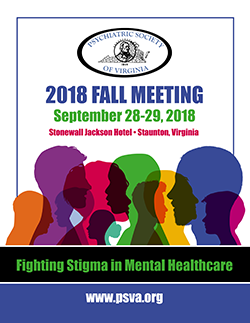Fall 2018 Issue |
|
She Followed Her Dream Despite Cultural Disapproval and Prejudice
Reprinted with permission from the editor of Psychiatric News.
By Asha Mishra, MD
Medical Director of Chesterfield County Mental Health Support Services
Chesterfield, Virginia
Born and raised in India, I did not grow up in one place or region or in the state (Rajasthan) from which I hail. I grew up influenced by all the prejudices and stigma of the time, including the state of my origin and the socioeconomic class of my birth. If it was not for my dad and his belief in education for girls, I would have ended up without any schooling and/or married off after earning a high school diploma.
As far back as I can remember, I dreamed of becoming a doctor. My dad supported me and stood his ground, defending my decision to his mother and other extended family members who worried about my deferring marriage and choosing to enter higher education.
Psychiatry as a career was not even in the cards until I finished medical school and got married. I was an OB-GYN house officer and on the path to becoming an obstetrician when I was introduced to my future spouse. He was living and working in the United Kingdom at the time but was making plans to move to the United States. After we married, I quit my second house-officer job and moved to Mumbai to spend time with my parents before emigrating to this country. The paperwork for my visa took longer than I had expected, however, so I accepted a house-officer position in neurosurgery with two renowned neurosurgeons. It was in this position that, by serendipity, I discovered my love for psychiatry. During medical school, psychiatry was barely on the radar for anyone in my class, despite the field trips to the local insane asylum where a couple of patients took a liking to me and wanted me to remain and hear them out.
In Mumbai, a case of a woman with temporal lobe epilepsy with a delusion of infidelity awoke my fascination with the field. Post-operatively, she maintained the delusion and would accuse the treatment team—including me—of having an affair with her husband. Then I encountered the case of a two-year-old boy who had fallen from a three-story building and arrived with his brains spilling out. I watched him defy the odds and recover and return for a post-op visit fully recovered. His recovery after a traumatic brain injury intrigued me, as did post-op delirium; a surgical specialty, however, was not to my liking.
On arrival in the United States, serendipity hit again. Having cleared the exams, but missing the residency-application cycle, I chanced upon a staff physician job at the local state hospital on the med/surg unit. This allowed me time to think about my career path and consider how psychiatry and psychiatric patients piqued my interest — I loved their stories, before and after the onset of mental illness.
I was hooked. My supervisor was disappointed and refused to speak with me after I informed him of my plans to go into psychiatry. He was convinced that my “talent” was “being wasted” on psychiatry. Moreover, my father was convinced I was making the wrong choice. In the area where I come from, only individuals who were not considered a “good doctor” entered psychiatry. Family friends here and abroad tried to talk me out of entering psychiatry, but I was convinced that this was the path for me. People had always fascinated me — their stories intrigued and inspired me. I saw the heroism of my patients as they dealt with life’s challenges, often alone after being abandoned by their families. Psychiatry opened a window for me to help them heal and recover. My career is not just a career — it is a calling.
Over the years, mentored by the likes of John Romano and schooled in the biopsychosocial model, and now the cultural and spiritual model, I practice in community psychiatry and have a foot in academic psychiatry in the clinician-educator track.
To this day, my profession gives me great fulfillment. I am grateful for all the lessons I have learned from my patients and their families. I have been privileged to be part of their lives and not only help them through troubled times, but also share in the enjoyment of their successes and laughter. Now, I welcome the chance to integrate behavioral health and primary care, and not a day too soon.
YOUR NEWSLETTER IS NOW AVAILABLE ON YOUR SMARTPHONE AND TABLET!
JOIN PSV TODAY!
REGISTER TODAY!
PSV 2018
FALL MEETING
September 28-29, 2018
Stonewall Jackson Hotel
Staunton, Virginia
APA Find a Psychiatrist
Are you accepting new patients?
Opt into APA’s “Find A Psychiatrist” database. To view the functionality or opt-in, CLICK HERE
FYI: A link for this option has been added to the PSV website. Select the “About” button and then “Find a Psychiatrist” from the drop down.





